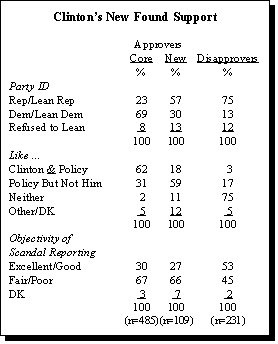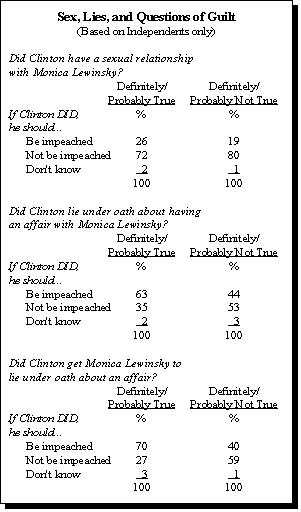Introduction and Summary
A strong State of the Union address combined with public anger at the news media fueled President Clinton’s unexpected lift to a 71% approval rating — even as allegations of a White House sex scandal consumed Washington. When asked in a Pew Research Center re-interview survey why they had changed their minds about Clinton in the two weeks since the allegations broke, Clinton’s new found supporters cited his State of the Union speech (20%); his ability to carry on despite the controversy (13%); and heightened news coverage of his presidency (11%).
Sympathy for a president beleaguered by a press perceived as biased and inaccurate is an important element in Clinton’s support. Overall, the public gives press coverage of the scandal a mixed rating: 51% fair/poor vs. 46% excellent/good. But Americans are highly critical of the media’s fact checking, its objectivity and the amount of punditry associated with the story. Strikingly, 69% of Pew’s respondents think that most reporters presume Clinton is guilty of perjury, while only 9% of the public think this is definitely true.

In an unusual twist, the controversy has broadened Clinton’s base, at least for now. Fully 57% of Americans who now approve of the President, but had not prior to the controversy, are Republicans and Independents. An equal share of these new supporters (59%) say they do not like Clinton personally, but do like his policies. These new supporters are not alone in drawing a distinction between Clinton the man and Clinton the president: 39% of Americans like both the man and his policies; 30% like his policies but dislike him; while 23% like neither. Put another way, 53% of Americans do not like the president personally, but 70% like his policies.
These are the principle findings of a January 30-February 2 Pew Research Center survey that re-interviewed 844 respondents who were initially polled by phone in mid-January. The survey has a margin of error of 4%. A full questionnaire and results are attached.
Story Stalls, Opinions Change
[*NOTE: CNN/USA Today/Gallup Poll, January 25-26, 1998.]

With the accusations still unproven after two weeks of round-the-clock media inquiry, many fewer Americans think the scandal is a matter of great importance to the nation than did so in the first week. As many as 40% expressed that view in a January 24-26 nationwide CBS News poll. Only 25% hold that opinion in the new survey. Even among Republicans, less than a majority (43%) think the scandal is very important.
Hypothetical Consequences and Opinion Now
Americans are equivocal about whether Clinton should be removed from office if he lied under oath (50% say yes vs. 46% no) or encouraged others to lie (48% yes vs. 47% no). The responses to these hypothetical questions hinge on how people feel now about his guilt or innocence. People who now think that Clinton definitely or probably lied or encouraged lying, overwhelmingly believe he should go, if these charges are true. But those who doubt the charges today say he should stay, even if the charges are true.
Partisanship is evident in these patterns of opinion, so the views of political independents are revealing. Independents who now think Clinton is guilty believe he should leave office, if the allegations about lying are true. However, they do not think a sexual relationship with Lewinsky is grounds for Clinton’s removal. Even Republicans reject that as a sole basis for the President’s removal from office.

